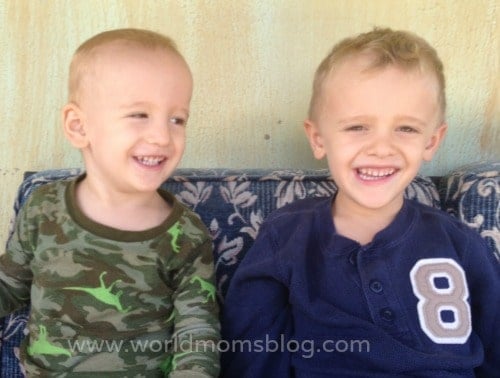
by Mama Mzungu (Kenya) | Jan 8, 2014 | 2014, Brothers, Kenya, Kids, Milestones, Motherhood, Parenting, World Moms Blog, World Motherhood

As a new mother, I felt disoriented a lot, I imagine like most of you. I mean, who was this wondrous little creature, equal parts mom and dad and maybe bit of a wayward uncle somewhere in there.
New babies are all instinct, nervous system and an unrelenting digestive system. We, the new moms, eagerly search for any hint of their uniqueness – anything that separates them from other babies and helps us learn about the little emerging person they are. Are they independent or clingy? A giggler or more serious? An old soul or a new one (if you’re so inclined to think that way)?
And with every expression of something new – a proclivity or an interest or an emotion – I wondered: Is this just typical baby stuff or is it an expression of his unique Caleb-ness. We found it incredible how much he responded to music and loved to kick around balls with a deftness that seemed beyond his babyhood. We harbored fantasies related to orchestral and athletic prowess. But, really, wasn’t this stuff universal? Don’t all babies love music and playing with orb-shaped objects?
That was the root of my disorientation: which of this stuff was the embodiment of babyhood and which was the embodiment of this particular baby? In this one way (and ONLY in that way) I was a bit envious of a friend who had fraternal twins. At each developmental stage their uniqueness was obvious. Susie was the shy one who loved to snuggle and Jack was the independent one who never wanted to sleep.
With an only child there is simply no point of comparison. A first born defines what a baby is. It’s a tall order for such a little guy.
Now here I am with my second boy in my arms. And everything he does is inevitably compares to his brother. He talks later, clings more, sleeps worse, snuggles more, fears strangers more etc… THAN his brother. His teeth came in closer together, his fingers are longer, he loves animals more, is less interested in television shows and wants to be carried more THAN his brother. You’d think I’d finally be relieved by being able to know my baby in comparison to some precedent.
But instead of providing a touchstone to better understand my baby, I find myself wondering if these comparisons are fair to the little guy. It’s as if I can’t understand him outside of his relation to his brother. Somehow, now that I have a frame of reference, I find myself doing the inevitable human thing of sorting and comparing. Sometimes it provides a useful orientation, and sometimes I wonder if it prevents me from fully seeing my baby.
I love those boys more than I thought possible. I feel more protective of and endeared to them than anyone else on the planet. And cliché as it is, that love grows every day. That love defies an intellectual “understanding” of who each one is as person. But, knowing your child is the color within the thickly etched lines of that raw human love. I want to see those colors as clearly as possible.
What do you other mamas think of this? Do you have trouble truly “seeing” your kids not in relation to their siblings? Does it even matter?
This is an original post to World Moms Blog by our writer in Kenya, Mama Mzungu, who writes at www.mamamzungu.com .
Photo credit to the author.
Originally from Chicago, Kim has dabbled in world travel through her 20s and is finally realizing her dream of living and working in Western Kenya with her husband and two small boys, Caleb and Emmet. She writes about tension of looking at what the family left in the US and feeling like they live a relatively simple life, and then looking at their neighbors and feeling embarrassed by their riches. She writes about clumsily navigating the inevitable cultural differences and learning every day that we share more than we don’t. Come visit her at Mama Mzungu.
More Posts - Website
Follow Me:


by Mamma Simona (South Africa) | Dec 9, 2013 | 2013, Africa, Cultural Differences, Death and Dying, Human Rights, Humanity, Inspirational, Politics, World Events
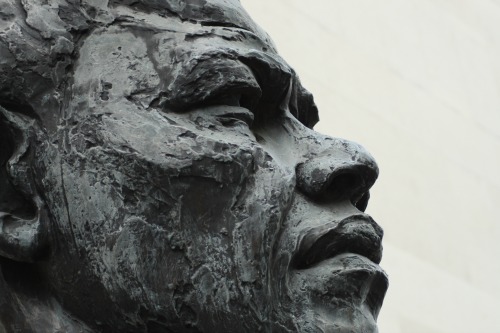
On December 5th, I woke up to the news that Nelson Rolihlahla Mandela, affectionately known as Madiba, had passed away after being “on his deathbed” for several months.
In the short time since his death, (not to mention during his many years of service to his country and world), so much has already been written and said about this great man that the only thing I can add is my personal story.
My parents, sister and I emigrated to South Africa from Italy in 1977. Back then, television and radio were heavily censored and through the media, we were taught that Nelson Mandela and the ANC (African National Congress) were “terrorists” who planted bombs and killed innocents.
Our lives were good and we didn’t question the segregation in government schools. My husband (whose family also emigrated from Italy a few years before mine) went to a private school where people of all religions and colors were happily accepted, as long as they could afford the fees.
In my opinion, Apartheid was never as rigorously enforced in Cape Town as it was elsewhere in the country. Be that as it may, most of us grew up blissfully unaware of human rights abuses and the like.
Fast forward to the 1990’s and most “white” people feared the worst. In fact, there were so many people leaving the country that a common saying was; “Will the last person to leave South Africa please switch off the lights?”
In my humble opinion it was Nelson Mandela, more than anyone else, who allowed South Africa to transition as smoothly as it did. The civil war which everyone feared just didn’t happen. Madiba revealed himself to be a man who was the polar opposite of whom many of us thought him to be (a “terrorist”). He earned everyone’s respect and admiration. He was a really great leader who never forgot where he came from. By that I mean that he never let “power” go to his head. He remained humble and approachable, and spread a message of peace and reconciliation. Mandela’s compassion and love for his fellow man are traits we’d all do well to emulate.
Sadly, the Presidents who have come after Nelson Mandela have betrayed his legacy. Madiba wanted everyone to have a better life. Sadly, things in this country have gone from bad to worse since Madiba stepped down. The most tragic part of all is that it is the very poor, “previously disadvantaged”, people who Madiba sought to empower who are worse off now than ever.
I feel I need to leave the last word to Dr. John Demartini, who wrote this in tribute to the great Nelson Mandela: ” From passive to activist and from prisoner to President one man became a legend in his lifetime though stationed in simplicity and limited in residence he moved the world. Nearly a century of living, but ultimately millenniums of presence, Nelson was contributive through the very core of his essence. It is time to reflect on his great accomplishments and revere his message. Let us all dig deeper into our own nature and find grace and poise since this one man’s direction was the purpose of freedom and presence not race. “
What one quality did you most admire in Nelson Mandela? How can use that quality in yourself to help make the world a better place?
R.I.P. Nelson Rolihlahla Mandela (1918 – 2013)
This is an original post for World Moms Blog by Mamma Simona from Cape Town, South Africa. She shares her home with a husband, 2 kids, 2 cats and 2 dogs.
Photo Credit To: Paul Simpson : Flickr Creative Commons
This photo has a creative commons attribution license.
Mamma Simona was born in Rome (Italy) but has lived in Cape Town (South Africa) since she was 8 years old. She studied French at school but says she’s forgotten most of it! She speaks Italian, English and Afrikaans. Even though Italian is the first language she learned, she considers English her "home" language as it's the language she's most comfortable in. She is happily married and the proud mother of 2 terrific teenagers! She also shares her home with 2 cats and 2 dogs ... all rescues.
Mamma Simona has worked in such diverse fields as Childcare, Tourism, Library Services, Optometry, Sales and Admin! (With stints of SAHM in-between). She’s really looking forward to the day she can give up her current Admin job and devote herself entirely to blogging and (eventually) being a full-time grandmother!
More Posts - Website
Follow Me:


by Alison Fraser | Dec 2, 2013 | 2013, Africa, AIDS, Canada, Education, Girls, Human Rights, Humanitarian, Humanity, Inspirational, International, Kids, Life Lesson, ONE, Philanthropy, Poverty, Preschool, School, Social Good, Spirituality, Women's Rights, World Moms Blog, World Voice

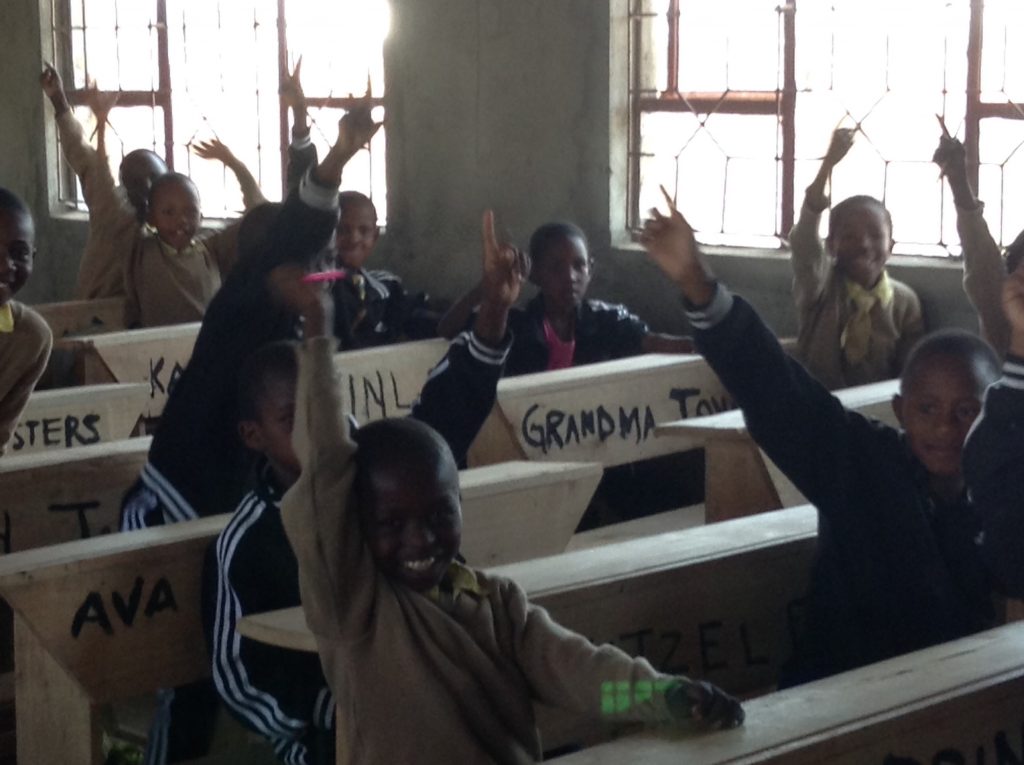
Photo by Alison Fraser
Anne Frank once said “No one has ever become poor by giving”. What a beautiful thought to keep in mind as we celebrate Giving Tuesday on December 3rd of this year. The act of giving can do wonders for a person’s spirit, soul and general well-being. Whether you give time, financial support, a lending hand, a listening ear or encouraging words, the act of giving is unique in that it often benefits the giver as much, or even more, than the receiver. This is something that I can attest to now more than ever before.
A few weeks ago, I visited Tanzania. I run a small Canadian Not for Profit Organization that works to fund the educational needs of women and children in and around Arusha. This was my first trip to Tanzania and the first time to meet all of the wonderful families that are involved in my organization. Helping these families has always made me feel good. I always felt like it was an equal partnership where I would provide financial assistance through fundraising in Canada and the Tanzanian women and children would allow me a glimpse into their life from afar. However, what I realized from spending ten days with these amazing people is that the partnership really isn’t equal at all. In fact, I truly believe that what I have received from these incredibly strong, spiritual, kind, compassionate and caring families is much more than what I have given them.
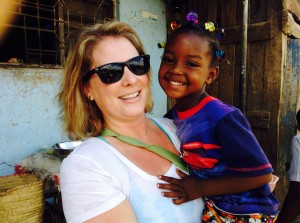
The author with a student in Tanzania.
Let me explain how the power of giving has changed my life. I donate countless hours of time to help those in the Mom2Mom Africa organization. Why? It makes me happy.
It fulfills me in ways that I can’t explain. I feel a sense of purpose, like I am making a difference, albeit very small, but nonetheless, a difference in the world. My charity work completes me and makes me feel like a whole person. I can’t explain why…it just does. But, the ten days that I spent in Tanzania last month, visiting families and spending time at the schools has changed my life forever. I have never experienced anything so powerful in all of my life. Yes, I gave up family time to spend in Tanzania and I gave up quite a bit financially to pay for the trip. But, NOTHING could prepare me for what I was given in return. My life has been changed by simply spending time with these families over the course of my time in Africa. They breathed fresh air and a new life into me by just being themselves. Their sense of community, their compassion towards one another, and their love of life despite many struggles has inspired me in ways that I still have yet to process and understand. The power of giving has never been more apparent to me. It can change lives. It has changed mine.
Today, on Giving Tuesday, I am begging you to give of yourself. Whether it be time, a lending hand or financial assistance…give.
Give to someone who may need your help, whether it be across the ocean or right in your backyard. What you will get back in return will outweigh what you have given. I can promise you that. Giving of oneself has the power to change the world in so many ways. It is reciprocal. What you put into giving, will come back to you in abundance.
That is the power of giving. Giving changes all lives involved. As Anne Frank also said, “How wonderful it is that nobody need wait a single moment before starting to improve the world”. So give. Change the world. You can do it. What may seem like a small act of giving can mean a world of difference to someone else.
On this Giving Tuesday, consider helping a family in Tanzania by purchasing a personalized desk for our schools, school uniforms, or school textbooks. You will bring a smile to the face of a child in Tanzania. And that, I guarantee, will bring a smile to your face, as well! Happy Giving Tuesday!
How do you plan to give back this Giving Tuesday?
This is an original post for World Moms Blog Written by Alison Fraser.
Alison Fraser is the mother of three young girls ranging in age from 5 to 9 years old. She lives with her family in Cambridge, Ontario, Canada. Alison works as an Environmental Toxicologist with a human environment consulting company and is an active member of the Society of Environmental Toxicology and Chemistry (SETAC). She is also the founder and director of the Canadian Not for Profit Organization, Mom2Mom Africa, which serves to fund the school fees of children and young women in rural Tanzania. Recently recognized and awarded a "Women of Waterloo Region" award, Alison is very involved in charitable events within her community including Christmas Toy and School Backpack Drives for the local foodbank.
More Posts - Website
Follow Me:



by Mamma Simona (South Africa) | Nov 27, 2013 | 2013, Africa, Family, Home, Kids, Life Balance, Motherhood, Older Children, Parenting, South Africa, Stress, Womanhood, World Motherhood
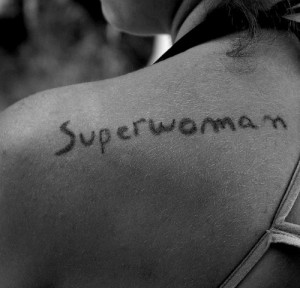 Several years ago I was diagnosed with Fibromyalgia. It’s a common disorder affecting about 5% of all women and is characterized by widespread pain and many other symptoms.
Several years ago I was diagnosed with Fibromyalgia. It’s a common disorder affecting about 5% of all women and is characterized by widespread pain and many other symptoms.
Fibromyalgia is not a psychiatric disorder, even though a particular kind of anti-depressant or anti-seizure medication is sometimes helpful in controlling the nerve pain.
In my case, on a “good” day I feel the same body “achiness” and fatigue normally associated with the flu. On a “bad” day any movement brings tears to my eyes.
The reason I mentioned my Fibromyalgia is just to illustrate a point – as moms we tend to put everybody else’s well-being ahead of our own. My daily pain and fatigue is my new “normal” so for the most part I don’t even mention it. Despite my daily pain, I hold down a full-time job, do chores, do charity work and study online. Do I think I’m “special” for doing all that? Absolutely not!
Yet I still feel guilty because my husband cooks most night. I also rely on my teenage daughter to do a lot around the house and on my son to clean up the yard. I constantly feel that I’m not doing a good enough job of taking care of my house and my family. I want to be a better wife, mother and employee but I’m physically unable to do more than what I already do.
My husband and children are very loving and supportive. They don’t have a problem with helping out. I’m the one who feels like a failure when I can’t do everything I think I should be doing.
Even knowing that I’m doing the best I can, my inner critic doesn’t seem to cut me any slack. My best is simply not good enough. There, I’ve said it. I don’t think I’m a good enough wife and mother and that’s all I care about. What’s funny is that I know (in my head) that I can’t be all bad. I know I must be doing something right because I have a great relationship with my husband and I’ve helped to raise two really amazing young people.
Recently I started feeling worse than usual but I just chalked it up to my Fibromyalgia and kept on going. I finally went to see my doctor when the bad days weren’t letting up.
It turned out that I was feeling so awful not because of my Fibromyalgia (although that surely didn’t help) but because I had a bacterial infection that had spread from my sinuses to my chest. I was diagnosed with sinusitis, laryngitis and a chest infection – all of which required antibiotics and bed rest. I didn’t even know it was possible to have all three at the same time.
Obviously my doctor booked me off work. I stayed home but of course I felt guilty about not going to the office. I know I’m far from unique in this regard. No matter how “good” we moms try to be, we always feel that we’re somehow dropping the ball.
Why is that? Why is it that we are able to be so supportive of each other and so compassionate towards others, but we’re so harsh with ourselves?
I know that I need to learn a new way of living. I need to find a way to stop feeling guilty about things that are outside my control.
If you were hoping for some answers from this post, I’m sorry to disappoint you. I don’t have any answers, just a lot of questions.
How do you change more than 40 years of conditioning so that your children learn a different way of being through your example? How do you learn to accept your limitations with grace and gratitude? How do you start being as kind to yourself as you are to others?
This is an original post for World Moms Blog by Mamma Simona from Cape Town, South Africa. She shares her home with a husband, 2 kids, 2 cats and 2 dogs.
Photo Credit To: Hans Van Den Berg : Flickr Creative Commons
This photo has a creative commons attribution license.
Mamma Simona was born in Rome (Italy) but has lived in Cape Town (South Africa) since she was 8 years old. She studied French at school but says she’s forgotten most of it! She speaks Italian, English and Afrikaans. Even though Italian is the first language she learned, she considers English her "home" language as it's the language she's most comfortable in. She is happily married and the proud mother of 2 terrific teenagers! She also shares her home with 2 cats and 2 dogs ... all rescues.
Mamma Simona has worked in such diverse fields as Childcare, Tourism, Library Services, Optometry, Sales and Admin! (With stints of SAHM in-between). She’s really looking forward to the day she can give up her current Admin job and devote herself entirely to blogging and (eventually) being a full-time grandmother!
More Posts - Website
Follow Me:


by Elizabeth Atalay | Nov 26, 2013 | 2013, Africa, AIDS, Health, ONE, World Events, World Moms Blog
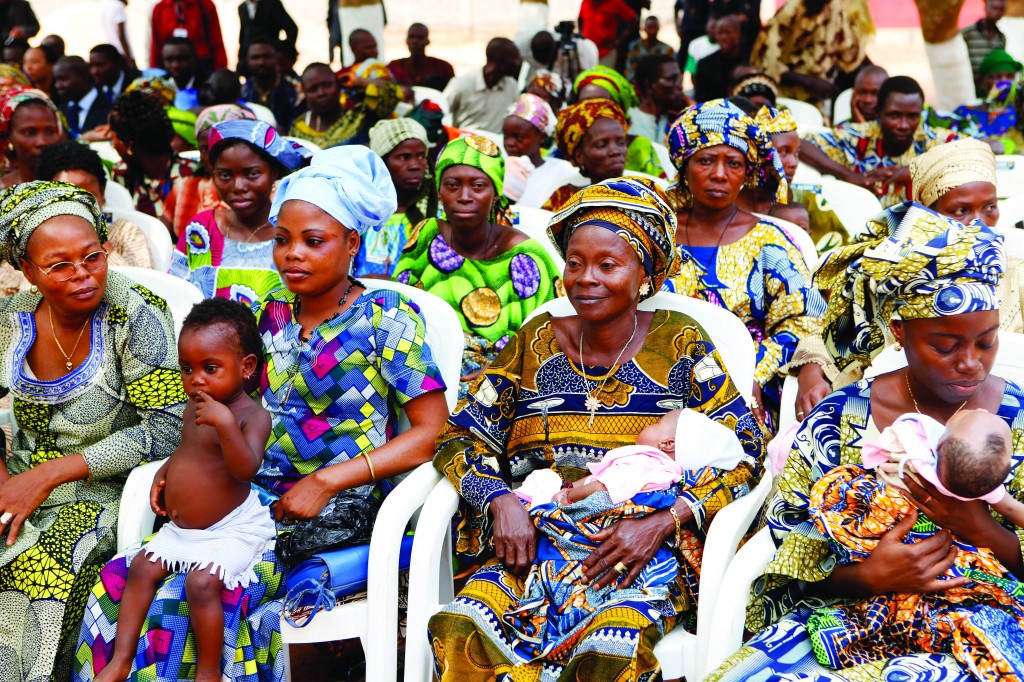
A community meeting of HIV-positive women who have benefitted from prevention of mother-to-child transmission (PMTCT) services and health counselors in Dangbo, Benin. Through the expanding availability of these services, it is now possible to imagine a generation of children being born free from HIV.- photo credit The Global Fund
Optimistic news was released today in the annual accountability report on AIDS by ONE. The highlight is that the sweeping statement “AIDS in Africa” has now become obsolete. African countries are shown in this new report to have made such widely varied progress in the fight against AIDS that the generalization of the continent as a whole no longer makes sense. At this point there are 16 countries in Sub-Saharan Africa that have reached the tipping point of being at the beginning of the end of AIDS. At the same time, other countries are still far behind in the struggle against the disease.
On the 25th World AIDS Day marked on December 1st of 2013, ONE’s new report on the global AIDS fight shows we are closing in on the tipping point.
According to ONE’s 2013 analysis: If current rates of acceleration continue, we could achieve the beginning of the end of AIDS – when the number of people newly added to treatment surpasses the number newly infected with HIV by 2015
Ironically, the AIDS fight has lost some political momentum because of its many successes. Because it is no longer perceived as a global health emergency, but rather a chronic and manageable disease, the fight has lost some of its political momentum. Along with the financial commitment, political leadership at the national and local levels has proved to be essential in driving real gains across the continent.
The three key targets outlined in the report where world leaders should focus significant attention in order to make headway against the disease are:
- The virtual elimination of mother-to-child transmission of HIV by 2015
- Access to treatment for 15 million HIV-positive individuals by 2015
- The drastic reduction of new adult and adolescent HIV infections, to approximately 1.1 million or fewer annually, by 2015.
The data in the assessment breaks down the progress of nine African countries and where they stand in meeting the 2015 goals:
leading the Way: Ghana, Malawi and Zambia are great examples of how international donors, national governments and key civil society leaders can work together to achieve accelerated progress in the fight against AIDS. Zambia and Malawi entered the decade with two of the world’s most widespread, crippling AIDS epidemics. Today, they – along with Ghana – are the world’s leaders in ending the epidemic, having made swift and steady progress over the last few years. All three countries have committed significant national resources for health, have reached and surpassed the tipping point at the country level, and are making even further headway towards the control and defeat of the disease.
ones to Watch: South Africa, Tanzania and Uganda have shown real dynamism but erratic progress as they face massive disease burdens, shifting political landscapes and unique, country-specific challenges. These countries have made significant strides in recent years, but their progress has been slower than in the leading countries. South Africa and Tanzania hit the tipping point for the beginning of the end of AIDS for the first time just last year, and Uganda – with an AIDS ratio of 1.1 – is close to the tipping point but has yet to reach it. Given unsteady progress against the AIDS epidemic in recent years, how these countries move forward in the next 1–2 years will be crucial.
Urgent Progress needed: Cameroon, Nigeria and Togo have not made enough progress, having often been hampered by a lack of political will or competing political priorities, insufficient financial commitments, inefficient delivery systems and a lack of specific attention to prevention. Togo, in particular, had reached the AIDS tipping point in 2010 but has slipped back since. Meanwhile, progress towards the beginning of the end of AIDS has been largely stagnant in Nigeria and Cameroon, albeit with dramatic year-to-year fluctuations in the AIDS ratio. These countries, and others like them, must show a serious acceleration of efforts to achieve the beginning of the end of AIDS by 2015.
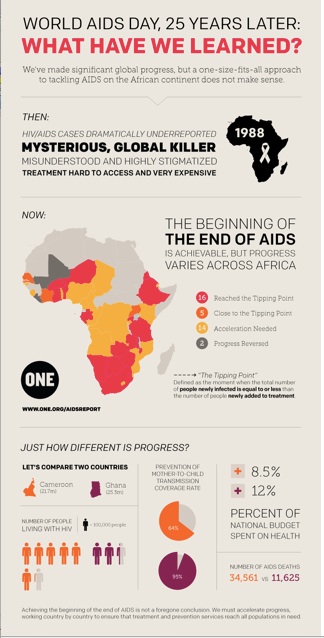
Despite the overall positive progress made in the fight against AIDS the momentum needs to continue to win. Prevention of new infections is key, transparency in reporting, political involvement, targeted resources, and keeping the AIDS issue in the forefront of the global agenda are all critical to the success of this campaign.
This is a big week for the AIDS community, with a hugely successful (RED) auction this past Saturday night, the 25thWorld AIDS Day, and the Global Fund replenishment. The (RED) auction on Saturday raised $13 million which was matched by Bill and Melinda Gates for a total $26 million for the Global Fund. Let’s keep the momentum going!
To learn more you can read the full report
here.
About ONE
Co-founded by Bono, ONE is a campaigning and advocacy organization of more than three million people taking action to end extreme poverty and preventable disease… because the facts show extreme poverty has already been cut in half and can be virtually eradicated by 2030.
ONE does not ask for your money, but for your voice.
Find out more at ONE.org
This is an original World Moms Blog post written by Elizabeth Atalay of www.documama.org. All information comes from The Beginning of The End? Tracking Global Commitments On AIDS Volume 2 ONE Data Report.
- A community meeting of HIV-positive women who have benefitted from prevention of mother-to-child transmission (PMTCT) services and health counselors in Dangbo, Benin. Through the expanding availability of these services, it is now possible to imagine a generation of children being born free from HIV.- photo courtesy of ONE.org

Elizabeth Atalay is a Digital Media Producer, Managing Editor at World Moms Network, and a Social Media Manager. She was a 2015 United Nations Foundation Social Good Fellow, and traveled to Ethiopia as an International Reporting Project New Media Fellow to report on newborn health in 2014. On her personal blog, Documama.org, she uses digital media as a new medium for her background as a documentarian. After having worked on Feature Films and Television series for FOX, NBC, MGM, Columbia Pictures, Warner Brothers, 20th Century Fox, and Castle Rock Pictures, she studied documentary filmmaking and anthropology earning a Masters degree in Media Studies from The New School in New York. Since becoming a Digital Media Producer she has worked on social media campaigns for non-profits such as Save The Children, WaterAid, ONE.org, UNICEF, United Nations Foundation, Edesia, World Pulse, American Heart Association, and The Gates Foundation. Her writing has also been featured on ONE.org, Johnson & Johnson’s BabyCenter.com, EnoughProject.org, GaviAlliance.org, and Worldmomsnetwork.com. Elizabeth has traveled to 70 countries around the world, most recently to Haiti with Artisan Business Network to visit artisans in partnership with Macy’s Heart of Haiti line, which provides sustainable income to Haitian artisans. Elizabeth lives in New England with her husband and four children.
More Posts

by Elizabeth Atalay | Nov 6, 2013 | 2013, Africa, Education, Social Good, World Moms Blog, World Voice, Younger Children
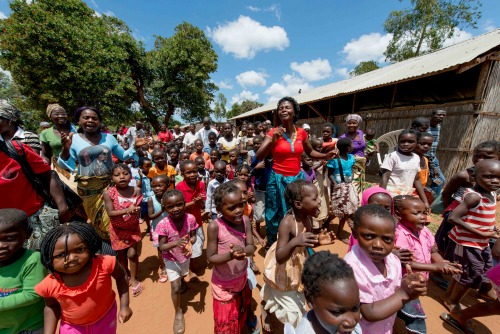
Singing and dancing is the order of the day as this procession of Save the Children preschool graduates, teachers and community members in Mozambique’s Gaza Province makes its way across the school ground to the nearby primary school, where the little graduates will be studying next year. Photo credit: Pei Ketron for Save the Children. October 2013.
In a newly published preschool programs are described as a promising policy option for improving the school readiness and later success of poor and disadvantaged children in rural Africa.
Tonight at 9pm EST World Moms Blog will join Save The Children and Multicultural Kid Blogs at #Moms4MDGs to discuss the importance of early education, and as a specific example, the success of the Save The Children preschool program in Mozambique. Ajla Grozdanic of Save The Children recently returned from a site visit to Mozambique and the early education programs there. She shared her insight in an interview with World Moms Blog as a lead up to tonights Twitter party:
World Moms Blog: In a Chicken & Egg sense, are early education programs only able to be initiated in areas where some basic infrastructure is already in place, i.e. access to clean water, healthcare & nutrition, or are they catalysts for communities to begin to pull out of extreme poverty?
AG: We are able to initiate education programs in communities at any level. In other words, having a basic infrastructure in place is not a pre-requisite for education programs, which can range from in-home daycare to in-school programs.
In fact, early childhood education can bring catalytic change for communities. Early childhood development centers and programs provide an opportunity to reach young children with basic services like healthcare and nutrition, which can be more difficult to deliver if we depended on parents to seek out these services on their own. Early childhood development centers also facilitate community mobilization, bringing parents and other community members together for projects, such as digging wells or cleaning stagnant water that hosts malaria.
Young children naturally learn from and imitate what’s in their environment–good or bad. For this reason, educating young children is key and it fosters the kinds of attitudes and behavior that can improve community well-being over the long term, such as developing good hygiene and healthy eating habits and sharing this knowledge with siblings and neighborhood children.
WMB: Could you explain a bit why Mozambique was a good fit for this program? What is the success rate for other similar early education programs Save the Children runs in other countries?
AG: Mozambique had very low coverage for preschool or early childhood development programs, so the need and demand was high. It’s also important to note that the local communities demonstrated an openness and eagerness to engage in these issues. Communities saw the potential and agreed to invest in their young children. Once they saw the results, which were very good, the word spread and the demand grew.
The World Bank Study, which is the first such evaluation of early childhood development programs in Africa, showed that children in rural Mozambique, who attended Save the Children’s preschool programs, were 24 percent more likely to enroll in primary school and were significantly better equipped to learn than children not covered by the program. While we haven’t had the funding to conduct similar studies in other countries where we offer such programs, our own results monitoring shows a similar success rate across the board.
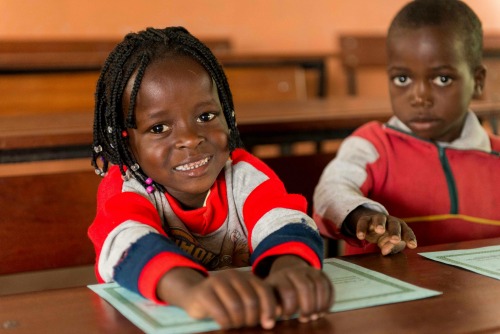
Save the Children preschool graduate, Vania, 5, from the Gaza Province in Mozambique, joined by a future classmate, gets a taste of what it will be like to sit at a real desk when she enters primary school next year. Preschoolers in her village are used to sitting on mats on the floor and were excited to sit in ‘big-kid’ chairs and desks at the nearby primary school. Photo credit: Pei Ketron for Save the Children. October 2013.
WMB: Do you see the benefits in terms of kids who have had these early intervention programs staying in school longer, and particularly for girls, marrying later or are these programs too new to tell yet?
AG: Children enrolled in preschool have a greater chance of going to school, going to school at the right age, and staying in school longer. They have higher graduation rates and are less likely to drop out of school or end up imprisoned. What’s more, staying in school is a mechanism to protect girls from early marriage. While it’s still too early to prove long-term benefits of preschool, such as that it results in girls marrying later in life, we hope to conduct such longitudinal studies in the future.
WMB: Are the children given meals through the program as an incentive for parents to send them or are the community members generally open and willing participants?
AG: It is usually not sustainable to provide meals to all children who are enrolled in preschool. Taking this into account, in most communities preschool lasts for half the school day so children can come home for meals. In some communities, parents might pool their resources in order to provide meals at preschools. In addition, preschools provide an opportunity to educate parents on how to improve nutrition for their child.
The willingness of parents to enroll their children in preschool varies from parent to parent and from community to community. Oftentimes, we’ll have a group of early adopters who are eager to enroll their children and whose success, in turn, inspires a wave of other parents–who prefer a stand-back, wait-and-see approach–to sign up their little ones.
WMB: Had you been to Mozambique before?
AG: No, this was my first time.
WMB: What is the best way people reading could support the Save the Children preschool programs in the developing world?
AG: Your readers could become a sponsor to support early childhood programs in developing countries. They could also advocate to the U.S. government to include preschool and early childhood development in its international aid programs. To learn more, visit www.savethechildren.org.
WMB: How have the mothers responded to these programs? (ie. gives them the opportunity to go to work or tend to smaller children)
AG: We encourage the participation of both mothers and fathers in their children’s education. Sending their children to preschool allows parents to tend to their daily chores, work in the field or otherwise provide for their family while knowing that their children are in good hands and are learning, to boot. In traditional societies, where childcare falls on women, preschools certainly offer an opportunity for women to engage in more productive labor and earn an additional income for their family. And we know from experience that when women earn more income for their families, they tend to invested in their children.
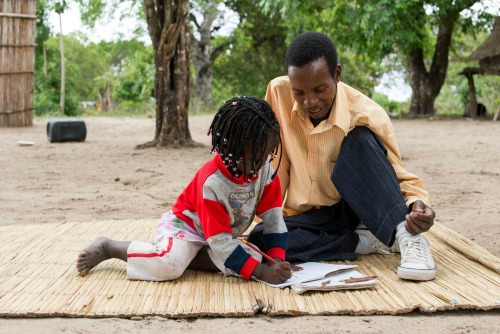
Vania, 5, practices the alphabet and counting every day with her father, Armando, who is a teacher at his daughter’s preschool, which is supported by Save the Children. Photo credit: Pei Ketron for Save the Children. October 2013.
This is an original interview and post for World Moms Blog.


Elizabeth Atalay is a Digital Media Producer, Managing Editor at World Moms Network, and a Social Media Manager. She was a 2015 United Nations Foundation Social Good Fellow, and traveled to Ethiopia as an International Reporting Project New Media Fellow to report on newborn health in 2014. On her personal blog, Documama.org, she uses digital media as a new medium for her background as a documentarian. After having worked on Feature Films and Television series for FOX, NBC, MGM, Columbia Pictures, Warner Brothers, 20th Century Fox, and Castle Rock Pictures, she studied documentary filmmaking and anthropology earning a Masters degree in Media Studies from The New School in New York. Since becoming a Digital Media Producer she has worked on social media campaigns for non-profits such as Save The Children, WaterAid, ONE.org, UNICEF, United Nations Foundation, Edesia, World Pulse, American Heart Association, and The Gates Foundation. Her writing has also been featured on ONE.org, Johnson & Johnson’s BabyCenter.com, EnoughProject.org, GaviAlliance.org, and Worldmomsnetwork.com. Elizabeth has traveled to 70 countries around the world, most recently to Haiti with Artisan Business Network to visit artisans in partnership with Macy’s Heart of Haiti line, which provides sustainable income to Haitian artisans. Elizabeth lives in New England with her husband and four children.
More Posts
























